|
|
|
Sort Order |
|
|
|
Items / Page
|
|
|
|
|
|
|
| Srl | Item |
| 1 |
ID:
160449
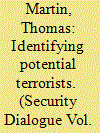

|
|
|
|
|
| Summary/Abstract |
This article analyses how British counter-radicalization policy in general, and the Channel project in particular, constitute individuals who are vulnerable to radicalization as visible, producing them as subjects of intervention. It thus asks, how can potential terrorists be identified and made knowable? The article first argues that to understand Channel, it is crucial to develop a conceptual account of the security politics of (in)visibilization that draws attention to the ways in which security regimes can, at times, function primarily through the production of regimes of (in)visibility. Using this approach, the article focusses on the role of ‘indicators’ as a technology of (in)visibilization. This role is central to the functioning of Channel, visibilizing certain subjects as threatening. Yet such a production is political. In bringing together a politics of care and a politics of identity, it is a regime of (in)visibility that produces new sites of intervention, contains significant potential consequences for the expression of certain identities, and raises new and troubling possibilities for how contemporary life may be secured.
|
|
|
|
|
|
|
|
|
|
|
|
|
|
|
|
| 2 |
ID:
160451
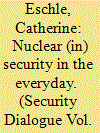

|
|
|
|
|
| Summary/Abstract |
This article extends the emergent focus on ‘the everyday’ in critical security studies to the topic of nuclear (in)security, through an empirical study of anti-nuclear peace activists understood as ‘everyday security practitioners’. In the first part of the article, I elaborate on the notion of everyday security practitioners, drawing particularly on feminist scholarship, while in the second I apply this framework to a case study of Faslane Peace Camp in Scotland. I show that campers emphasize the everyday insecurities of people living close to the state’s nuclear weapons, the blurred boundaries between ‘us’ and ‘them’, and the inevitability of insecurity in daily life. Moreover, campers’ security practices confront the everyday reproduction of nuclear weapons and prefigure alternative modes of everyday life. In so doing, I argue, they offer a distinctive challenge to dominant deterrence discourse, one that is not only politically significant, but also expands understanding of the everyday in critical security studies.
|
|
|
|
|
|
|
|
|
|
|
|
|
|
|
|
| 3 |
ID:
160452
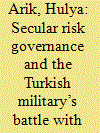

|
|
|
|
|
| Summary/Abstract |
Prior to its currently subservient position to civilian politics, the Turkish military had always had an autonomous position with a strong ideological commitment to safeguard secularism. From the 1980s to the end of the 2000s, the Turkish military played a key role in the construction of political Islam as a form of risk and in the securitization of religion both in the public sphere and within its own structure. This article examines the Turkish military’s security discourse around religion and the Islamic headscarf through the experiences of women in military families, and is based on ethnographic fieldwork conducted in 2011. Looking at headscarf regulations and the everyday life on military bases, it explores how the military governed Islamism as a form of risk in culturally and sexually specific ways. Drawing on critical security studies that approach risk as a form of social governance, the article examines secular risk governance through the lived experiences of women in military families, the regulation of their daily conduct, and the representation of their bodies and sexual identities through dress. Concluding remarks examine the significance of secular risk governance in the post-2010 era.
|
|
|
|
|
|
|
|
|
|
|
|
|
|
|
|
| 4 |
ID:
160450
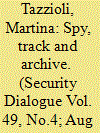

|
|
|
|
|
| Summary/Abstract |
This article focuses on the temporalities of visibility that are at stake in the functioning of two mapping monitoring softwares devised by Frontex: Eurosur and Jora. Through a study of border practices and security devices that builds on interviews and direct observation, the article shows that while these two systems elaborate on data and information collected in real time, they work as archives for generating future migration risk scenarios and not for border surveillance purposes. After illustrating in detail the functioning and modes of visualization of Jora and Eurosur, the article takes into account how police officers, Frontex and navies use these devices, and how risk analyses are produced. The article demonstrates that these monitoring mapping devices are sustained by coeval temporalities: the detection of migrants ‘on the spot’ coexists with both a future-oriented temporality and an archival one. The second part of the article analyses the impact that mapping monitoring softwares have on migrant journeys and migrant lives. The article concludes by bringing attention to the ways in which migrants in part strategically appropriate and twist the temporality of security and the field of visibility enacted by these devices.
|
|
|
|
|
|
|
|
|
|
|
|
|
|
|
|
| 5 |
ID:
160448
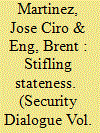

|
|
|
|
|
| Summary/Abstract |
This article assesses the impact of the Assad regime’s aerial bombardment campaign on a frequently neglected component of Syria’s ongoing civil war: rebel governance. While analysis of the military and humanitarian ramifications of such attacks has been extensive, these perspectives fail to consider how the Assad regime’s counter insurgency efforts subvert governance practices by Syria’s diverse rebel groups. Drawing on performative approaches to the ‘state’, we argue that opposition groups’ daily enactments of ‘stateness’ via two key welfare services – bread and healthcare provision – constitute a historically inflected and locally grounded critique of the incumbent. When executed successfully, such enactments can stabilize relations between rulers and ruled while offering a vision of an alternative polity. They can also attract the attention of rivals. The Assad regime’s aerial bombing campaign of rebel-held areas is thus neither a haphazard military strategy nor simply the product of long-standing sectarian hatreds, but a deliberate tactic through which it seeks to destroy a key threat to its authority.
|
|
|
|
|
|
|
|
|
|
|
|
|
|
|
|
|
|
|
|
|